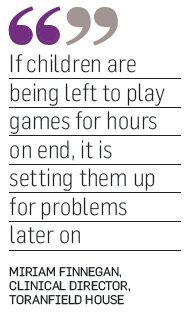Is our growing usage of digital media such as social networking sites, games and apps, as well as the temptation to dabble in a bit of online gambling, causing a new surge of problems, such as
detachment from the real world and, in severe cases, addictions?
In March, when Facebook updated its filing for its IPO, it revealed that in January users of the social networking site spent 10.5bn minutes on it each day. That figure, however, did not take in users accessing Facebook via mobile devices.
According to SocialBakers.com statistics, there are 2,137,240 Facebook users in Ireland, which would mean that around 46pc of the population has a Facebook account. SocialBakers.com claims Facebook users in Ireland grew by 43,280 in the past six months.
So is all of this extra time we are spending surfing the net causing us to become less social in the real world, and potentially causing new types of addictions, particularly around gaming and online gambling?
Internet addiction disorder research
According to Hannah Barton, a lecturer in psychology and programme co-ordinator of the MsC in cyberpsychology at Dún Laoghaire Institute of Art, Design and Technology, Dr Kimberly Young was one of the first people to carry out research on internet addiction disorder (IAD) back in 1996, when she presented a paper on it to the American Psychological Association.
“She developed the Internet Addiction Diagnostic Questionnaire (IADQ) to diagnose the disorder,” explains Barton. The IADQ asks eight questions around areas such as whether you stay longer on the internet than you originally intended or if you use the internet as a means of escaping from problems or as a way of relieving guilt, anxiety or depression, for instance.
Barton says other symptoms of IAD could include neglecting family and friends, or neglecting sleep to stay online.
“There is some debate around what exactly is addictive about the internet and the criteria and research used to categorise internet addiction disorder as a bona fide ‘addiction’,” she explains, pointing to the online mental health expert Dr John Grohol, who runs Psychcentral.com.
“The question he asks is – is there some inherent feature in the internet that makes it addictive or are addictive personalities just moving online?” explains Barton.
Facebook addiction test

In May, psychologists at the University of Bergen in Norway also revealed their Facebook addiction scale test – the Bergen Facebook Addiction Scale – in which people can determine whether they have an addiction to the site by answering six statements.
“I think Facebook addiction can be examined just like the other internet and behavioural addictions,” notes Barton.
And why are some of us compelled to share so much on social media? A recent paper by two researchers from the Department of Psychology at Harvard University, Diana Tamir and Jason Mitchell, explored why humans find it so rewarding to disclose information about themselves.
They noted that humans like to spend between 30-40pc of everyday speech divulging personal information.
The duo also looked to recent internet research about how more than 80pc of posts to social networking sites such as Twitter relate to our own immediate experiences.
As a result of using neuroimaging and cognitive methods on study participants, they claimed that sharing information about oneself is as intrinsically rewarding in the same way as when the brain is activated during primary rewards, such as food or sex.
Addiction to gaming and online gambling
As for online gambling and gaming addictions, Miriam Finnegan, clinical director at the Enniskerry, Co Wicklow-based addiction treatment centre Toranfield House, says the centre is seeing more people presenting with such addictions.
So what would classify as a gaming addiction? Finnegan says that, from research coming through, a gaming addiction would be when someone literally plays a game for 48 hours non-stop.
“They would even go without food. They are so focused on achieving in the game. We have had a few events of people coming to us who have been heavily involved in gaming. They would have been in their early 20s.”
She says she would strongly encourage parents to put time limits on their children’s gaming activities. “If children are being left to play games for hours on end, it is setting them up for problems later on.”
Finnegan says that gaming and gambling addictions in the online space are no different to more traditional addictions, such as alcoholism.
“Families and concerned people are often meeting a wall of denial when they try to get the person to stop the particular addiction.”
With online gambling, she says Toranfield is seeing more and more people, especially in the past eight months.
She points to recent research which shows how even when one loses in gambling, the same release of dopamine happens as when one takes illegal drugs or, indeed, alcohol.
“That surge causes them to try to regain their losses,” she explains. “Depression is often very closely interlinked with gambling.”
Be it with any addiction, Finnegan says the centre would look at the change in a person’s behaviour, and whether he or she has become more unsociable and is hiding things from people. “The important thing for us is getting people back to recovery,” she adds.